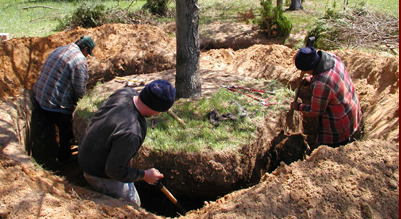Difference between revisions of "Nemawashi"
(Goal.) |
(+= Nemawashi-tree-digging.png) |
||
| (2 intermediate revisions by the same user not shown) | |||
| Line 2: | Line 2: | ||
|goal=decide wisely at the latest responsible moment | |goal=decide wisely at the latest responsible moment | ||
|stage=Sparkle | |stage=Sparkle | ||
|theme=Lean | |theme=Lean, Decide | ||
|context=any endeavor. | |context=any endeavor. | ||
|wish=Wise decisions at the latest responsible moment that are implemented fast propel everyone forward almost effortlessly. | |wish=Wise decisions at the latest responsible moment that are implemented fast propel everyone forward almost effortlessly. | ||
|so=Slowly and thouroughly consider and consent all real options, and implement decisions rapidly. | |so=Slowly and thouroughly consider and consent all real options, and implement decisions rapidly. | ||
|image=Nemawashi-tree-digging.png | |||
|wish full=Wise decisions at the latest responsible moment that are implemented fast propel everyone forward almost effortlessly. | |wish full=Wise decisions at the latest responsible moment that are implemented fast propel everyone forward almost effortlessly. | ||
|background=The Japanese believe in what they call "bottom round" management. This concept, sometimes called consent management or committee management, is an innate part of Japanese culture. It involves a slow decision-making process that attempts to reach a true {{p|consent}} rather than a consensus or compromise. While the decision-making process is slow the implementation process is fast. | |background=The Japanese believe in what they call "bottom round" management. This concept, sometimes called consent management or committee management, is an innate part of Japanese culture. It involves a slow decision-making process that attempts to reach a true {{p|consent}} rather than a consensus or compromise. While the decision-making process is slow the implementation process is fast. | ||
| Line 14: | Line 15: | ||
:''Nemawashi'' is often cited as an example of a Japanese word which is difficult to translate effectively, because it is tied so closely to Japanese culture itself, although it is often translated as 'laying the groundwork.' | :''Nemawashi'' is often cited as an example of a Japanese word which is difficult to translate effectively, because it is tied so closely to Japanese culture itself, although it is often translated as 'laying the groundwork.' | ||
From | From {{book|The Toyota Way|Jeffrey Liker}}: '''Principle 13'''—Make decisions slowly by consensus, thoroughly considering all options; implement decisions rapidly ({{p|nemawashi}}). | ||
'''Principle 13'''—Make decisions slowly by consensus, thoroughly considering all options; implement decisions rapidly ({{p|nemawashi}}). | |||
*Do not pick a single direction and go down that one path until you have thoroughly considered alternatives. When you have picked, move quickly and continuosly down the path. | *Do not pick a single direction and go down that one path until you have thoroughly considered alternatives. When you have picked, move quickly and continuosly down the path. | ||
Latest revision as of 10:17, 3 June 2015
…any endeavor.
✣ ✣ ✣
Wise decisions at the latest responsible moment that are implemented fast propel everyone forward almost effortlessly.
The Japanese believe in what they call "bottom round" management. This concept, sometimes called consent management or committee management, is an innate part of Japanese culture. It involves a slow decision-making process that attempts to reach a true consent rather than a consensus or compromise. While the decision-making process is slow the implementation process is fast.
Wikipedia:
- Nemawashi (根回し) in Japanese means an informal process of quietly laying the foundation for some proposed change or project, by talking to the people concerned, gathering support and feedback, and so forth. It is considered an important element in any major change, before any formal steps are taken, and successful nemawashi enables changes to be carried out with the consent of all sides.
- Nemawashi literally translates as "going around the roots", from 根 (ne, root) and 回す (mawasu, to go around [something]). Its original meaning was literal: digging around the roots of a tree, to prepare it for a transplant.
- Nemawashi is often cited as an example of a Japanese word which is difficult to translate effectively, because it is tied so closely to Japanese culture itself, although it is often translated as 'laying the groundwork.'
From The Toyota Way—Jeffrey Liker: Principle 13—Make decisions slowly by consensus, thoroughly considering all options; implement decisions rapidly (nemawashi).
- Do not pick a single direction and go down that one path until you have thoroughly considered alternatives. When you have picked, move quickly and continuosly down the path.
- nemawashi is the process of discussing problems and potential solutions with all of those affected, to collect their ideas and get agreement on a path forward. This consensus process, though time-consuming, helps broaden the search for solutions, and once a decision is made, the stage is set for rapid implementation.
real options capture the essence of the situation in which to make the decision.
Therefore:
Slowly and thouroughly consider and consent all real options, Implement decisions rapidly.
✣ ✣ ✣
✣ ✣ ✣
Sources
- The Toyota Way, Jeffrey Liker
- http://www.ame.org/sites/default/files/qrl_docs/Nemawashi.pdf
- http://en.wikipedia.org/wiki/Nemawashi
- http://blog.nayima.be/2009/06/19/nemawashi-decisions-by-consensus-without-compromise/
